Health Promotion Through the Lifespan: Old Age Health Issues Report
VerifiedAdded on 2023/01/18
|8
|2477
|63
Report
AI Summary
This report focuses on health promotion during the old age stage of the lifespan, exploring the health challenges and issues faced by the elderly. It highlights the impact of various factors, including lifestyle, chronic diseases like chronic kidney disease (CKD), and the interplay of nature, nurture, and cultural influences on health and psychological well-being. The report discusses common diseases associated with aging, such as cardiovascular diseases, arthritis, and diabetes, and analyzes their prevalence and impact on the elderly population. It emphasizes the importance of lifestyle choices, including diet, exercise, and regular check-ups, in mitigating health risks. The report also examines how genetic inheritance, environmental factors, and cultural norms affect the health of older adults. The conclusion underscores the need for proactive measures and interventions to promote healthy aging and improve the quality of life for the elderly, emphasizing the importance of addressing both physical and mental health concerns. This report provides valuable insights into the complexities of health promotion in old age and offers strategies to enhance the well-being of this demographic.

Health Promotion
Through the
Lifespan
Through the
Lifespan
Paraphrase This Document
Need a fresh take? Get an instant paraphrase of this document with our AI Paraphraser
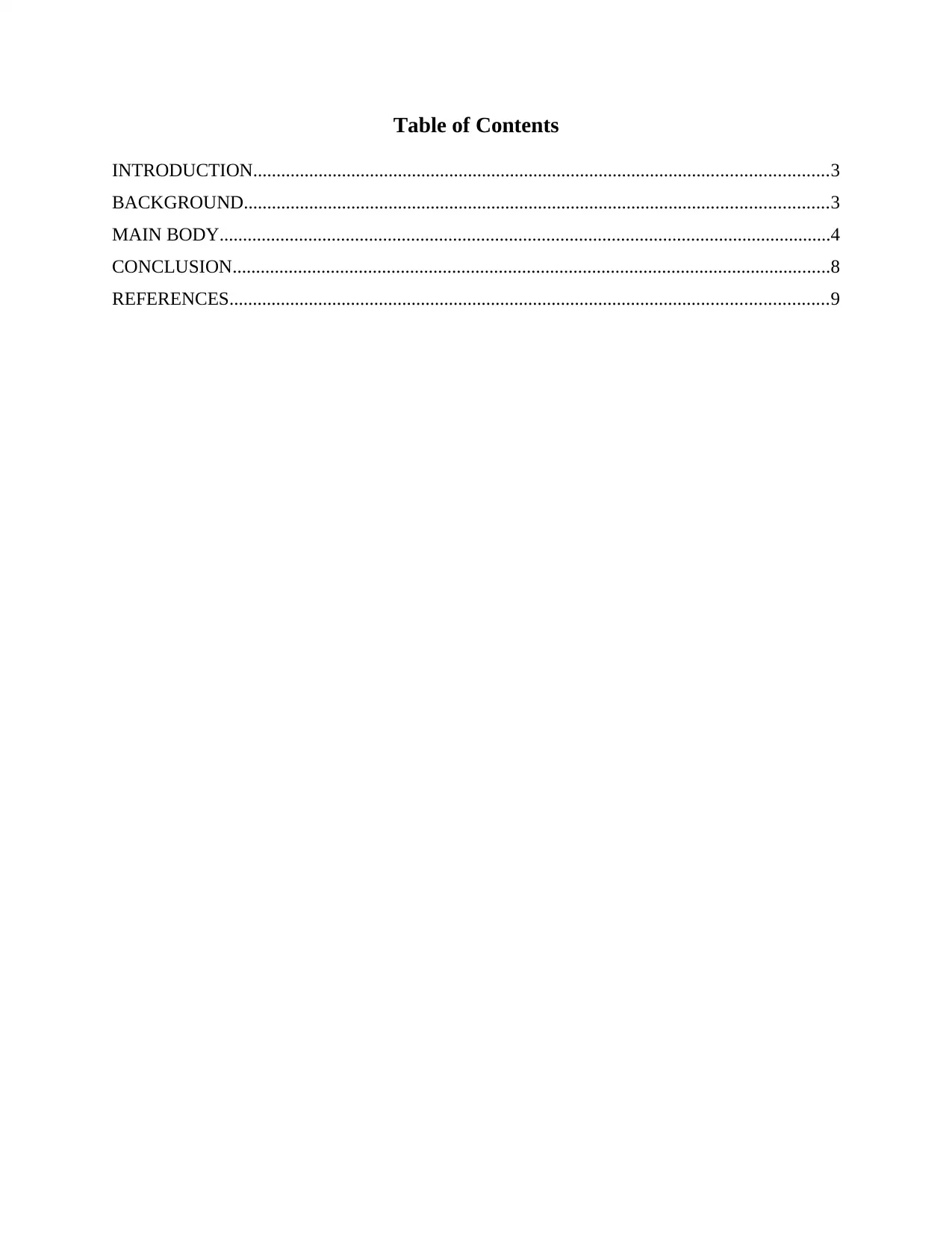
Table of Contents
INTRODUCTION...........................................................................................................................3
BACKGROUND.............................................................................................................................3
MAIN BODY...................................................................................................................................4
CONCLUSION................................................................................................................................8
REFERENCES................................................................................................................................9
INTRODUCTION...........................................................................................................................3
BACKGROUND.............................................................................................................................3
MAIN BODY...................................................................................................................................4
CONCLUSION................................................................................................................................8
REFERENCES................................................................................................................................9
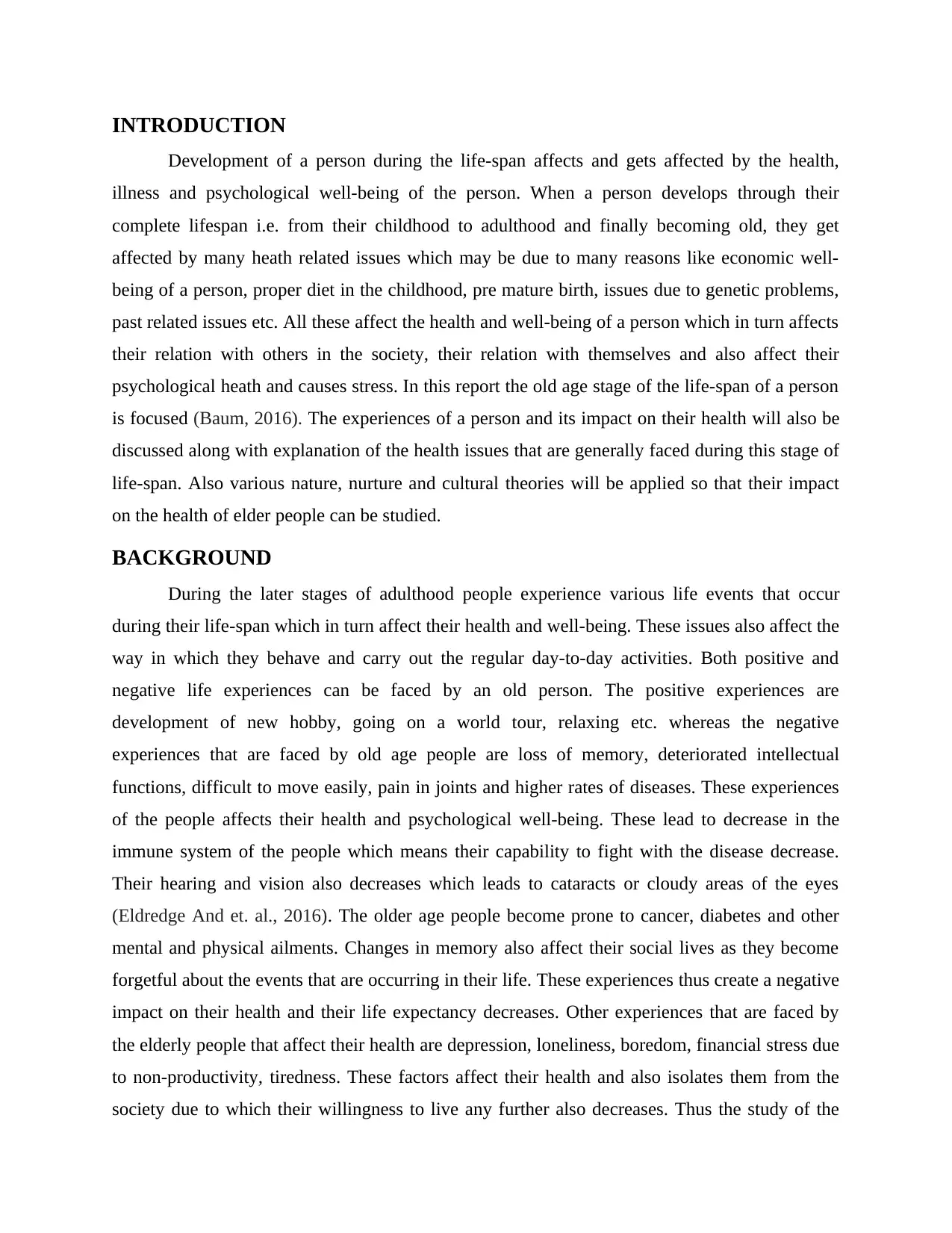
INTRODUCTION
Development of a person during the life-span affects and gets affected by the health,
illness and psychological well-being of the person. When a person develops through their
complete lifespan i.e. from their childhood to adulthood and finally becoming old, they get
affected by many heath related issues which may be due to many reasons like economic well-
being of a person, proper diet in the childhood, pre mature birth, issues due to genetic problems,
past related issues etc. All these affect the health and well-being of a person which in turn affects
their relation with others in the society, their relation with themselves and also affect their
psychological heath and causes stress. In this report the old age stage of the life-span of a person
is focused (Baum, 2016). The experiences of a person and its impact on their health will also be
discussed along with explanation of the health issues that are generally faced during this stage of
life-span. Also various nature, nurture and cultural theories will be applied so that their impact
on the health of elder people can be studied.
BACKGROUND
During the later stages of adulthood people experience various life events that occur
during their life-span which in turn affect their health and well-being. These issues also affect the
way in which they behave and carry out the regular day-to-day activities. Both positive and
negative life experiences can be faced by an old person. The positive experiences are
development of new hobby, going on a world tour, relaxing etc. whereas the negative
experiences that are faced by old age people are loss of memory, deteriorated intellectual
functions, difficult to move easily, pain in joints and higher rates of diseases. These experiences
of the people affects their health and psychological well-being. These lead to decrease in the
immune system of the people which means their capability to fight with the disease decrease.
Their hearing and vision also decreases which leads to cataracts or cloudy areas of the eyes
(Eldredge And et. al., 2016). The older age people become prone to cancer, diabetes and other
mental and physical ailments. Changes in memory also affect their social lives as they become
forgetful about the events that are occurring in their life. These experiences thus create a negative
impact on their health and their life expectancy decreases. Other experiences that are faced by
the elderly people that affect their health are depression, loneliness, boredom, financial stress due
to non-productivity, tiredness. These factors affect their health and also isolates them from the
society due to which their willingness to live any further also decreases. Thus the study of the
Development of a person during the life-span affects and gets affected by the health,
illness and psychological well-being of the person. When a person develops through their
complete lifespan i.e. from their childhood to adulthood and finally becoming old, they get
affected by many heath related issues which may be due to many reasons like economic well-
being of a person, proper diet in the childhood, pre mature birth, issues due to genetic problems,
past related issues etc. All these affect the health and well-being of a person which in turn affects
their relation with others in the society, their relation with themselves and also affect their
psychological heath and causes stress. In this report the old age stage of the life-span of a person
is focused (Baum, 2016). The experiences of a person and its impact on their health will also be
discussed along with explanation of the health issues that are generally faced during this stage of
life-span. Also various nature, nurture and cultural theories will be applied so that their impact
on the health of elder people can be studied.
BACKGROUND
During the later stages of adulthood people experience various life events that occur
during their life-span which in turn affect their health and well-being. These issues also affect the
way in which they behave and carry out the regular day-to-day activities. Both positive and
negative life experiences can be faced by an old person. The positive experiences are
development of new hobby, going on a world tour, relaxing etc. whereas the negative
experiences that are faced by old age people are loss of memory, deteriorated intellectual
functions, difficult to move easily, pain in joints and higher rates of diseases. These experiences
of the people affects their health and psychological well-being. These lead to decrease in the
immune system of the people which means their capability to fight with the disease decrease.
Their hearing and vision also decreases which leads to cataracts or cloudy areas of the eyes
(Eldredge And et. al., 2016). The older age people become prone to cancer, diabetes and other
mental and physical ailments. Changes in memory also affect their social lives as they become
forgetful about the events that are occurring in their life. These experiences thus create a negative
impact on their health and their life expectancy decreases. Other experiences that are faced by
the elderly people that affect their health are depression, loneliness, boredom, financial stress due
to non-productivity, tiredness. These factors affect their health and also isolates them from the
society due to which their willingness to live any further also decreases. Thus the study of the
⊘ This is a preview!⊘
Do you want full access?
Subscribe today to unlock all pages.

Trusted by 1+ million students worldwide
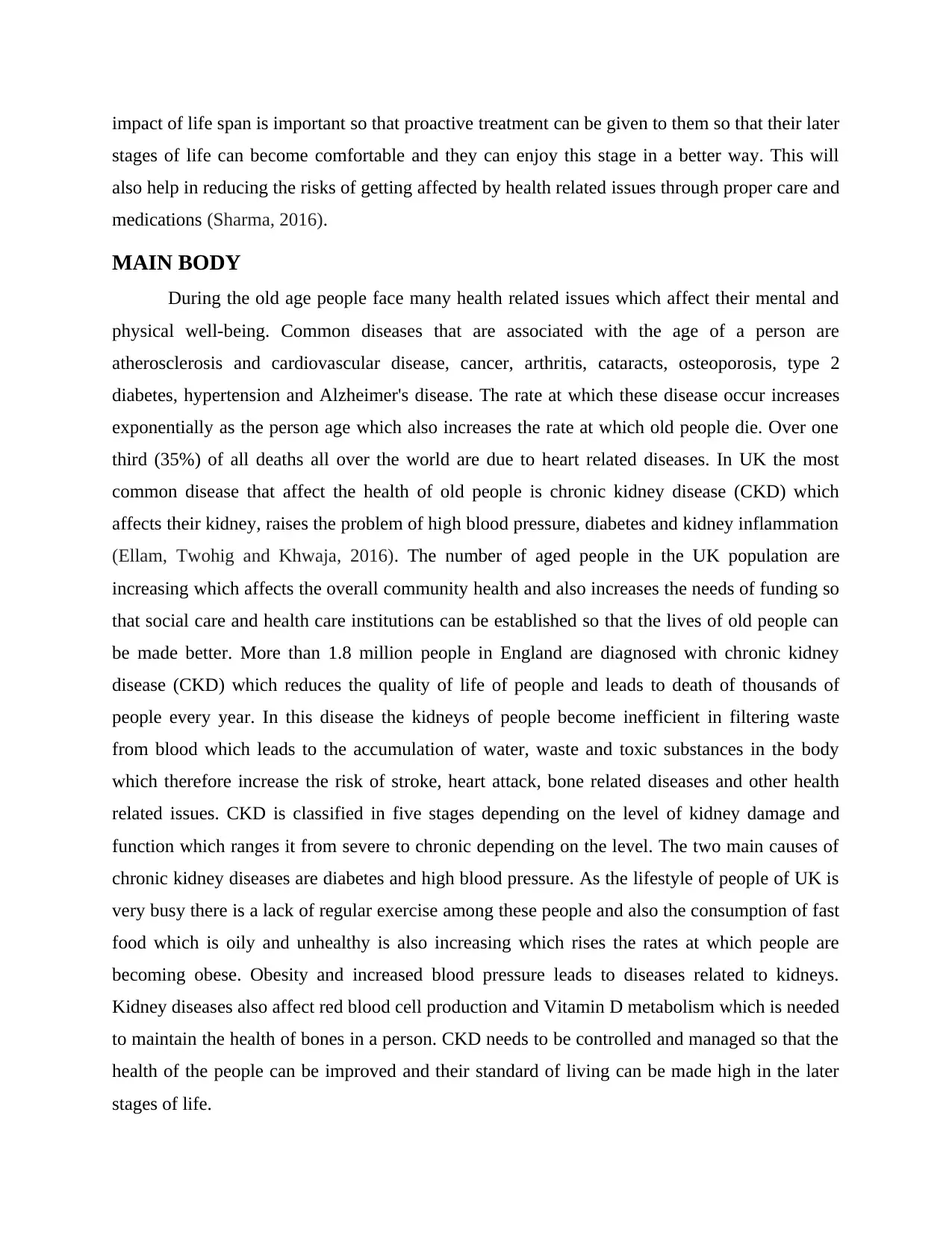
impact of life span is important so that proactive treatment can be given to them so that their later
stages of life can become comfortable and they can enjoy this stage in a better way. This will
also help in reducing the risks of getting affected by health related issues through proper care and
medications (Sharma, 2016).
MAIN BODY
During the old age people face many health related issues which affect their mental and
physical well-being. Common diseases that are associated with the age of a person are
atherosclerosis and cardiovascular disease, cancer, arthritis, cataracts, osteoporosis, type 2
diabetes, hypertension and Alzheimer's disease. The rate at which these disease occur increases
exponentially as the person age which also increases the rate at which old people die. Over one
third (35%) of all deaths all over the world are due to heart related diseases. In UK the most
common disease that affect the health of old people is chronic kidney disease (CKD) which
affects their kidney, raises the problem of high blood pressure, diabetes and kidney inflammation
(Ellam, Twohig and Khwaja, 2016). The number of aged people in the UK population are
increasing which affects the overall community health and also increases the needs of funding so
that social care and health care institutions can be established so that the lives of old people can
be made better. More than 1.8 million people in England are diagnosed with chronic kidney
disease (CKD) which reduces the quality of life of people and leads to death of thousands of
people every year. In this disease the kidneys of people become inefficient in filtering waste
from blood which leads to the accumulation of water, waste and toxic substances in the body
which therefore increase the risk of stroke, heart attack, bone related diseases and other health
related issues. CKD is classified in five stages depending on the level of kidney damage and
function which ranges it from severe to chronic depending on the level. The two main causes of
chronic kidney diseases are diabetes and high blood pressure. As the lifestyle of people of UK is
very busy there is a lack of regular exercise among these people and also the consumption of fast
food which is oily and unhealthy is also increasing which rises the rates at which people are
becoming obese. Obesity and increased blood pressure leads to diseases related to kidneys.
Kidney diseases also affect red blood cell production and Vitamin D metabolism which is needed
to maintain the health of bones in a person. CKD needs to be controlled and managed so that the
health of the people can be improved and their standard of living can be made high in the later
stages of life.
stages of life can become comfortable and they can enjoy this stage in a better way. This will
also help in reducing the risks of getting affected by health related issues through proper care and
medications (Sharma, 2016).
MAIN BODY
During the old age people face many health related issues which affect their mental and
physical well-being. Common diseases that are associated with the age of a person are
atherosclerosis and cardiovascular disease, cancer, arthritis, cataracts, osteoporosis, type 2
diabetes, hypertension and Alzheimer's disease. The rate at which these disease occur increases
exponentially as the person age which also increases the rate at which old people die. Over one
third (35%) of all deaths all over the world are due to heart related diseases. In UK the most
common disease that affect the health of old people is chronic kidney disease (CKD) which
affects their kidney, raises the problem of high blood pressure, diabetes and kidney inflammation
(Ellam, Twohig and Khwaja, 2016). The number of aged people in the UK population are
increasing which affects the overall community health and also increases the needs of funding so
that social care and health care institutions can be established so that the lives of old people can
be made better. More than 1.8 million people in England are diagnosed with chronic kidney
disease (CKD) which reduces the quality of life of people and leads to death of thousands of
people every year. In this disease the kidneys of people become inefficient in filtering waste
from blood which leads to the accumulation of water, waste and toxic substances in the body
which therefore increase the risk of stroke, heart attack, bone related diseases and other health
related issues. CKD is classified in five stages depending on the level of kidney damage and
function which ranges it from severe to chronic depending on the level. The two main causes of
chronic kidney diseases are diabetes and high blood pressure. As the lifestyle of people of UK is
very busy there is a lack of regular exercise among these people and also the consumption of fast
food which is oily and unhealthy is also increasing which rises the rates at which people are
becoming obese. Obesity and increased blood pressure leads to diseases related to kidneys.
Kidney diseases also affect red blood cell production and Vitamin D metabolism which is needed
to maintain the health of bones in a person. CKD needs to be controlled and managed so that the
health of the people can be improved and their standard of living can be made high in the later
stages of life.
Paraphrase This Document
Need a fresh take? Get an instant paraphrase of this document with our AI Paraphraser
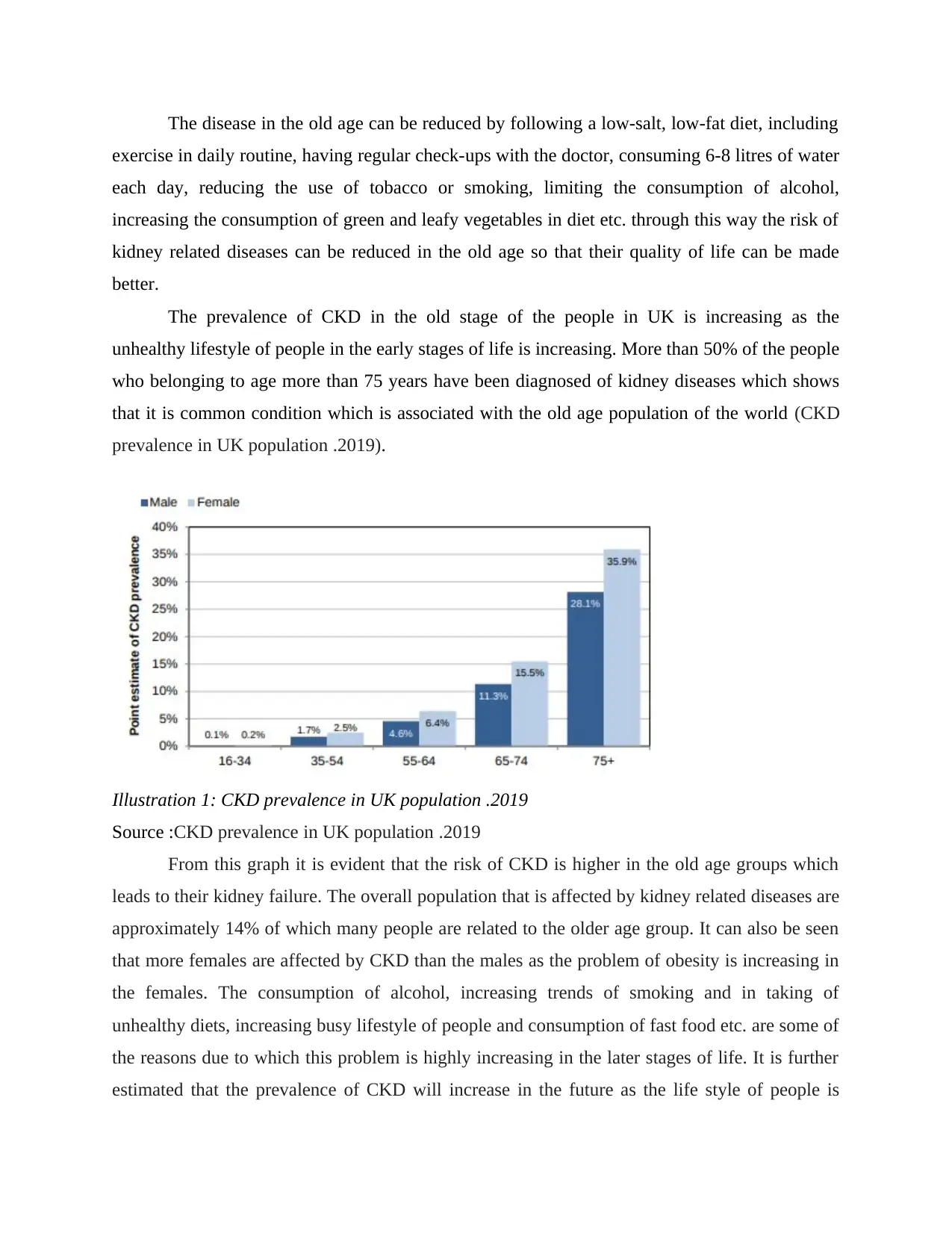
The disease in the old age can be reduced by following a low-salt, low-fat diet, including
exercise in daily routine, having regular check-ups with the doctor, consuming 6-8 litres of water
each day, reducing the use of tobacco or smoking, limiting the consumption of alcohol,
increasing the consumption of green and leafy vegetables in diet etc. through this way the risk of
kidney related diseases can be reduced in the old age so that their quality of life can be made
better.
The prevalence of CKD in the old stage of the people in UK is increasing as the
unhealthy lifestyle of people in the early stages of life is increasing. More than 50% of the people
who belonging to age more than 75 years have been diagnosed of kidney diseases which shows
that it is common condition which is associated with the old age population of the world (CKD
prevalence in UK population .2019).
Illustration 1: CKD prevalence in UK population .2019
Source :CKD prevalence in UK population .2019
From this graph it is evident that the risk of CKD is higher in the old age groups which
leads to their kidney failure. The overall population that is affected by kidney related diseases are
approximately 14% of which many people are related to the older age group. It can also be seen
that more females are affected by CKD than the males as the problem of obesity is increasing in
the females. The consumption of alcohol, increasing trends of smoking and in taking of
unhealthy diets, increasing busy lifestyle of people and consumption of fast food etc. are some of
the reasons due to which this problem is highly increasing in the later stages of life. It is further
estimated that the prevalence of CKD will increase in the future as the life style of people is
exercise in daily routine, having regular check-ups with the doctor, consuming 6-8 litres of water
each day, reducing the use of tobacco or smoking, limiting the consumption of alcohol,
increasing the consumption of green and leafy vegetables in diet etc. through this way the risk of
kidney related diseases can be reduced in the old age so that their quality of life can be made
better.
The prevalence of CKD in the old stage of the people in UK is increasing as the
unhealthy lifestyle of people in the early stages of life is increasing. More than 50% of the people
who belonging to age more than 75 years have been diagnosed of kidney diseases which shows
that it is common condition which is associated with the old age population of the world (CKD
prevalence in UK population .2019).
Illustration 1: CKD prevalence in UK population .2019
Source :CKD prevalence in UK population .2019
From this graph it is evident that the risk of CKD is higher in the old age groups which
leads to their kidney failure. The overall population that is affected by kidney related diseases are
approximately 14% of which many people are related to the older age group. It can also be seen
that more females are affected by CKD than the males as the problem of obesity is increasing in
the females. The consumption of alcohol, increasing trends of smoking and in taking of
unhealthy diets, increasing busy lifestyle of people and consumption of fast food etc. are some of
the reasons due to which this problem is highly increasing in the later stages of life. It is further
estimated that the prevalence of CKD will increase in the future as the life style of people is
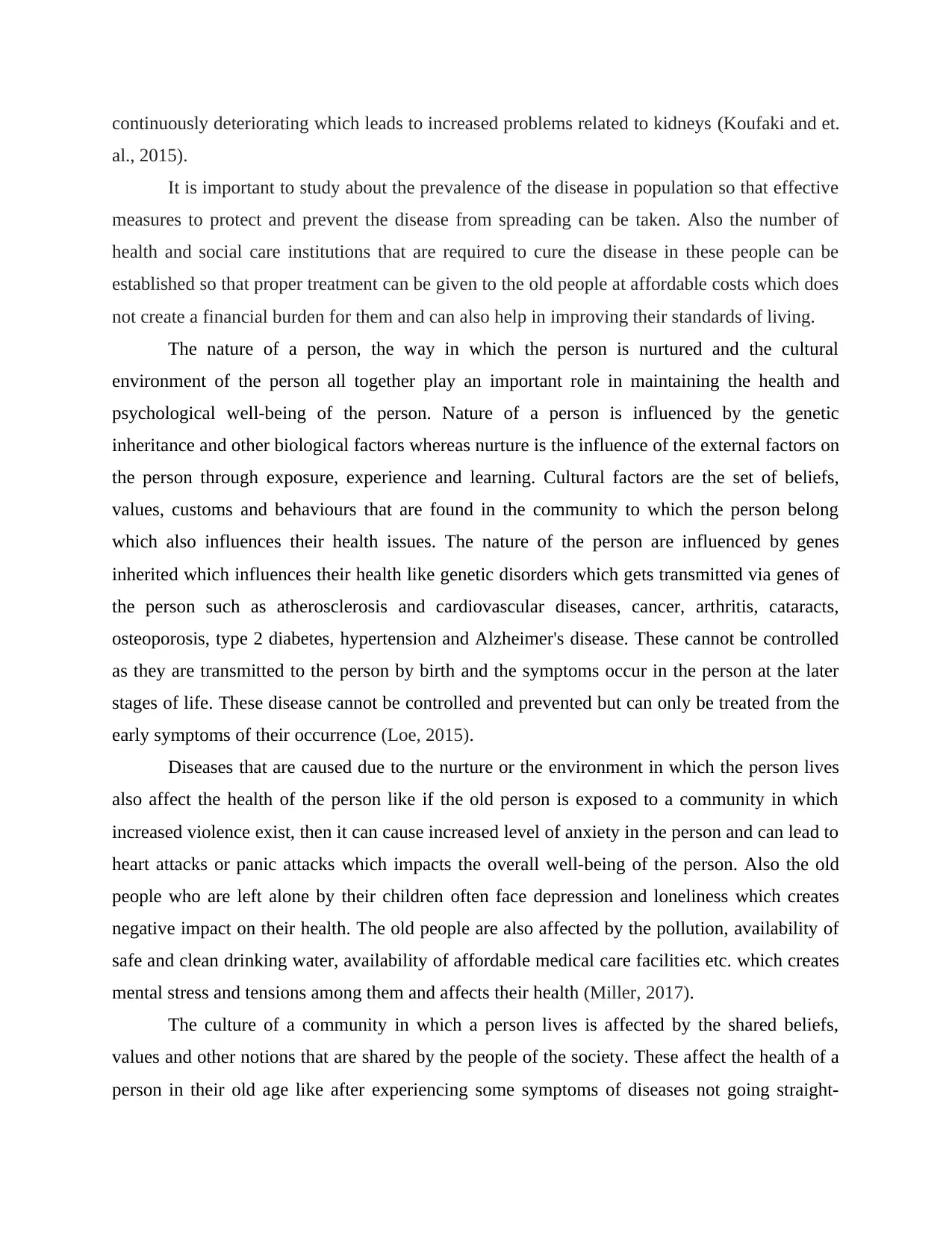
continuously deteriorating which leads to increased problems related to kidneys (Koufaki and et.
al., 2015).
It is important to study about the prevalence of the disease in population so that effective
measures to protect and prevent the disease from spreading can be taken. Also the number of
health and social care institutions that are required to cure the disease in these people can be
established so that proper treatment can be given to the old people at affordable costs which does
not create a financial burden for them and can also help in improving their standards of living.
The nature of a person, the way in which the person is nurtured and the cultural
environment of the person all together play an important role in maintaining the health and
psychological well-being of the person. Nature of a person is influenced by the genetic
inheritance and other biological factors whereas nurture is the influence of the external factors on
the person through exposure, experience and learning. Cultural factors are the set of beliefs,
values, customs and behaviours that are found in the community to which the person belong
which also influences their health issues. The nature of the person are influenced by genes
inherited which influences their health like genetic disorders which gets transmitted via genes of
the person such as atherosclerosis and cardiovascular diseases, cancer, arthritis, cataracts,
osteoporosis, type 2 diabetes, hypertension and Alzheimer's disease. These cannot be controlled
as they are transmitted to the person by birth and the symptoms occur in the person at the later
stages of life. These disease cannot be controlled and prevented but can only be treated from the
early symptoms of their occurrence (Loe, 2015).
Diseases that are caused due to the nurture or the environment in which the person lives
also affect the health of the person like if the old person is exposed to a community in which
increased violence exist, then it can cause increased level of anxiety in the person and can lead to
heart attacks or panic attacks which impacts the overall well-being of the person. Also the old
people who are left alone by their children often face depression and loneliness which creates
negative impact on their health. The old people are also affected by the pollution, availability of
safe and clean drinking water, availability of affordable medical care facilities etc. which creates
mental stress and tensions among them and affects their health (Miller, 2017).
The culture of a community in which a person lives is affected by the shared beliefs,
values and other notions that are shared by the people of the society. These affect the health of a
person in their old age like after experiencing some symptoms of diseases not going straight-
al., 2015).
It is important to study about the prevalence of the disease in population so that effective
measures to protect and prevent the disease from spreading can be taken. Also the number of
health and social care institutions that are required to cure the disease in these people can be
established so that proper treatment can be given to the old people at affordable costs which does
not create a financial burden for them and can also help in improving their standards of living.
The nature of a person, the way in which the person is nurtured and the cultural
environment of the person all together play an important role in maintaining the health and
psychological well-being of the person. Nature of a person is influenced by the genetic
inheritance and other biological factors whereas nurture is the influence of the external factors on
the person through exposure, experience and learning. Cultural factors are the set of beliefs,
values, customs and behaviours that are found in the community to which the person belong
which also influences their health issues. The nature of the person are influenced by genes
inherited which influences their health like genetic disorders which gets transmitted via genes of
the person such as atherosclerosis and cardiovascular diseases, cancer, arthritis, cataracts,
osteoporosis, type 2 diabetes, hypertension and Alzheimer's disease. These cannot be controlled
as they are transmitted to the person by birth and the symptoms occur in the person at the later
stages of life. These disease cannot be controlled and prevented but can only be treated from the
early symptoms of their occurrence (Loe, 2015).
Diseases that are caused due to the nurture or the environment in which the person lives
also affect the health of the person like if the old person is exposed to a community in which
increased violence exist, then it can cause increased level of anxiety in the person and can lead to
heart attacks or panic attacks which impacts the overall well-being of the person. Also the old
people who are left alone by their children often face depression and loneliness which creates
negative impact on their health. The old people are also affected by the pollution, availability of
safe and clean drinking water, availability of affordable medical care facilities etc. which creates
mental stress and tensions among them and affects their health (Miller, 2017).
The culture of a community in which a person lives is affected by the shared beliefs,
values and other notions that are shared by the people of the society. These affect the health of a
person in their old age like after experiencing some symptoms of diseases not going straight-
⊘ This is a preview!⊘
Do you want full access?
Subscribe today to unlock all pages.

Trusted by 1+ million students worldwide
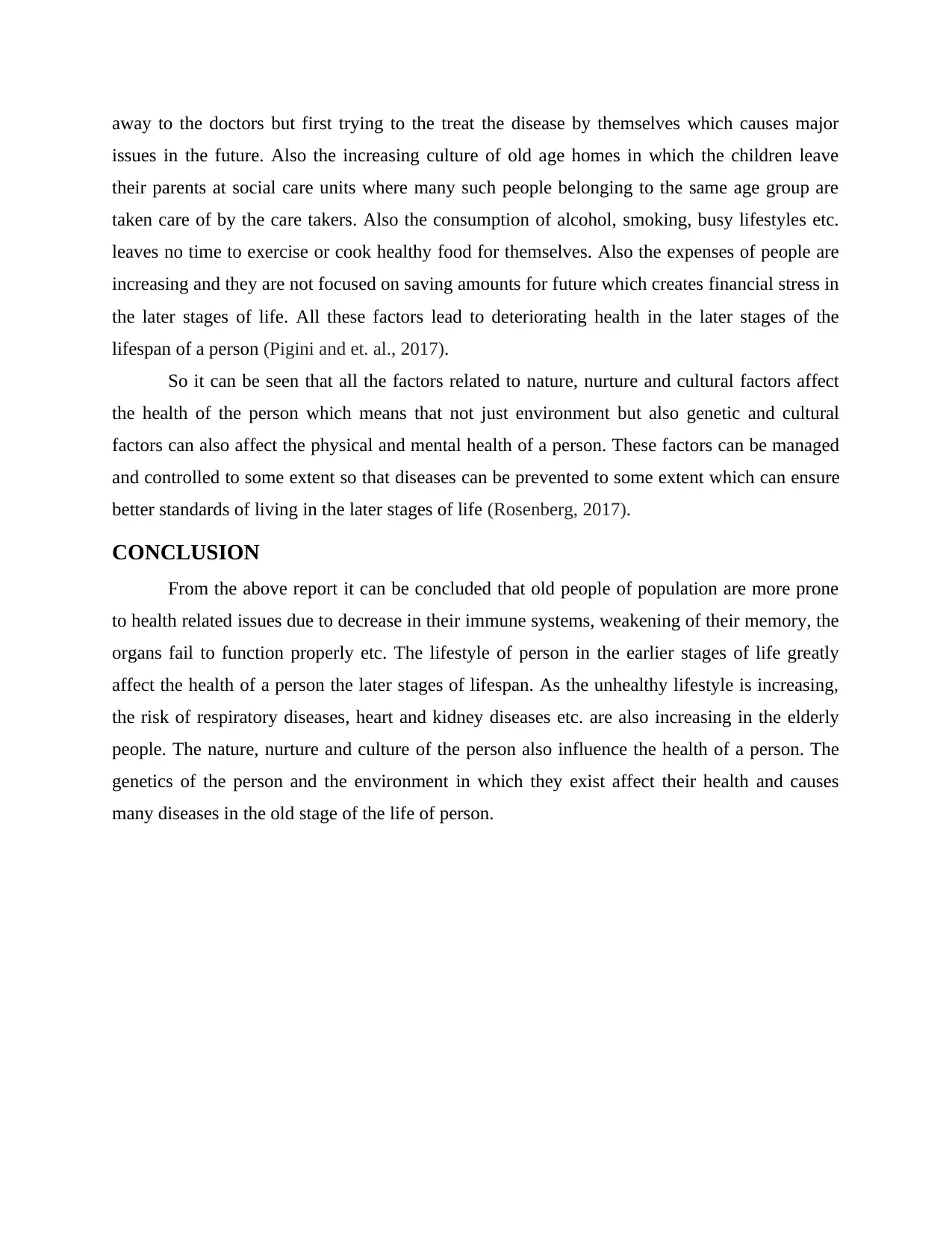
away to the doctors but first trying to the treat the disease by themselves which causes major
issues in the future. Also the increasing culture of old age homes in which the children leave
their parents at social care units where many such people belonging to the same age group are
taken care of by the care takers. Also the consumption of alcohol, smoking, busy lifestyles etc.
leaves no time to exercise or cook healthy food for themselves. Also the expenses of people are
increasing and they are not focused on saving amounts for future which creates financial stress in
the later stages of life. All these factors lead to deteriorating health in the later stages of the
lifespan of a person (Pigini and et. al., 2017).
So it can be seen that all the factors related to nature, nurture and cultural factors affect
the health of the person which means that not just environment but also genetic and cultural
factors can also affect the physical and mental health of a person. These factors can be managed
and controlled to some extent so that diseases can be prevented to some extent which can ensure
better standards of living in the later stages of life (Rosenberg, 2017).
CONCLUSION
From the above report it can be concluded that old people of population are more prone
to health related issues due to decrease in their immune systems, weakening of their memory, the
organs fail to function properly etc. The lifestyle of person in the earlier stages of life greatly
affect the health of a person the later stages of lifespan. As the unhealthy lifestyle is increasing,
the risk of respiratory diseases, heart and kidney diseases etc. are also increasing in the elderly
people. The nature, nurture and culture of the person also influence the health of a person. The
genetics of the person and the environment in which they exist affect their health and causes
many diseases in the old stage of the life of person.
issues in the future. Also the increasing culture of old age homes in which the children leave
their parents at social care units where many such people belonging to the same age group are
taken care of by the care takers. Also the consumption of alcohol, smoking, busy lifestyles etc.
leaves no time to exercise or cook healthy food for themselves. Also the expenses of people are
increasing and they are not focused on saving amounts for future which creates financial stress in
the later stages of life. All these factors lead to deteriorating health in the later stages of the
lifespan of a person (Pigini and et. al., 2017).
So it can be seen that all the factors related to nature, nurture and cultural factors affect
the health of the person which means that not just environment but also genetic and cultural
factors can also affect the physical and mental health of a person. These factors can be managed
and controlled to some extent so that diseases can be prevented to some extent which can ensure
better standards of living in the later stages of life (Rosenberg, 2017).
CONCLUSION
From the above report it can be concluded that old people of population are more prone
to health related issues due to decrease in their immune systems, weakening of their memory, the
organs fail to function properly etc. The lifestyle of person in the earlier stages of life greatly
affect the health of a person the later stages of lifespan. As the unhealthy lifestyle is increasing,
the risk of respiratory diseases, heart and kidney diseases etc. are also increasing in the elderly
people. The nature, nurture and culture of the person also influence the health of a person. The
genetics of the person and the environment in which they exist affect their health and causes
many diseases in the old stage of the life of person.
Paraphrase This Document
Need a fresh take? Get an instant paraphrase of this document with our AI Paraphraser
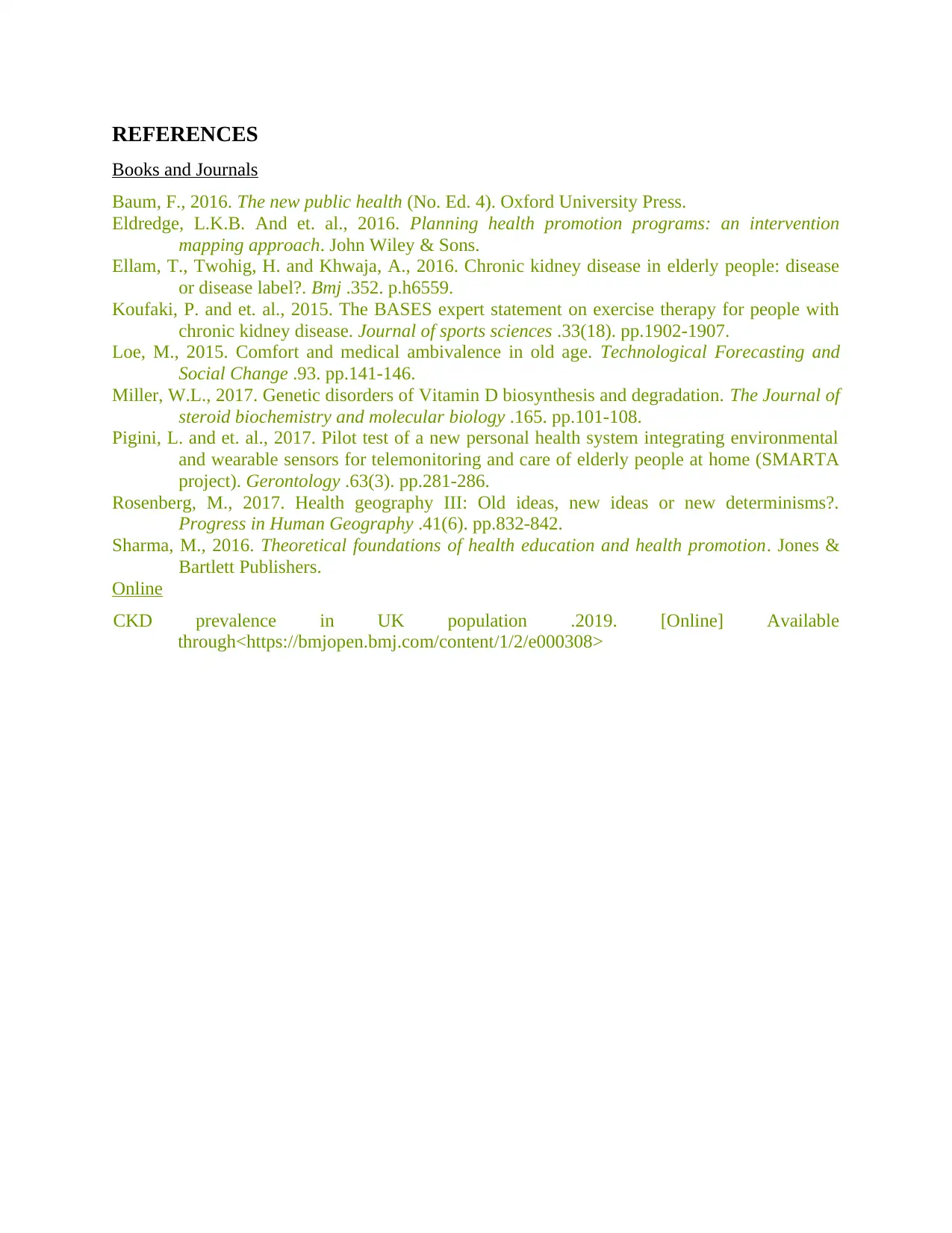
REFERENCES
Books and Journals
Baum, F., 2016. The new public health (No. Ed. 4). Oxford University Press.
Eldredge, L.K.B. And et. al., 2016. Planning health promotion programs: an intervention
mapping approach. John Wiley & Sons.
Ellam, T., Twohig, H. and Khwaja, A., 2016. Chronic kidney disease in elderly people: disease
or disease label?. Bmj .352. p.h6559.
Koufaki, P. and et. al., 2015. The BASES expert statement on exercise therapy for people with
chronic kidney disease. Journal of sports sciences .33(18). pp.1902-1907.
Loe, M., 2015. Comfort and medical ambivalence in old age. Technological Forecasting and
Social Change .93. pp.141-146.
Miller, W.L., 2017. Genetic disorders of Vitamin D biosynthesis and degradation. The Journal of
steroid biochemistry and molecular biology .165. pp.101-108.
Pigini, L. and et. al., 2017. Pilot test of a new personal health system integrating environmental
and wearable sensors for telemonitoring and care of elderly people at home (SMARTA
project). Gerontology .63(3). pp.281-286.
Rosenberg, M., 2017. Health geography III: Old ideas, new ideas or new determinisms?.
Progress in Human Geography .41(6). pp.832-842.
Sharma, M., 2016. Theoretical foundations of health education and health promotion. Jones &
Bartlett Publishers.
Online
CKD prevalence in UK population .2019. [Online] Available
through<https://bmjopen.bmj.com/content/1/2/e000308>
Books and Journals
Baum, F., 2016. The new public health (No. Ed. 4). Oxford University Press.
Eldredge, L.K.B. And et. al., 2016. Planning health promotion programs: an intervention
mapping approach. John Wiley & Sons.
Ellam, T., Twohig, H. and Khwaja, A., 2016. Chronic kidney disease in elderly people: disease
or disease label?. Bmj .352. p.h6559.
Koufaki, P. and et. al., 2015. The BASES expert statement on exercise therapy for people with
chronic kidney disease. Journal of sports sciences .33(18). pp.1902-1907.
Loe, M., 2015. Comfort and medical ambivalence in old age. Technological Forecasting and
Social Change .93. pp.141-146.
Miller, W.L., 2017. Genetic disorders of Vitamin D biosynthesis and degradation. The Journal of
steroid biochemistry and molecular biology .165. pp.101-108.
Pigini, L. and et. al., 2017. Pilot test of a new personal health system integrating environmental
and wearable sensors for telemonitoring and care of elderly people at home (SMARTA
project). Gerontology .63(3). pp.281-286.
Rosenberg, M., 2017. Health geography III: Old ideas, new ideas or new determinisms?.
Progress in Human Geography .41(6). pp.832-842.
Sharma, M., 2016. Theoretical foundations of health education and health promotion. Jones &
Bartlett Publishers.
Online
CKD prevalence in UK population .2019. [Online] Available
through<https://bmjopen.bmj.com/content/1/2/e000308>
1 out of 8
Related Documents
Your All-in-One AI-Powered Toolkit for Academic Success.
+13062052269
info@desklib.com
Available 24*7 on WhatsApp / Email
![[object Object]](/_next/static/media/star-bottom.7253800d.svg)
Unlock your academic potential
Copyright © 2020–2026 A2Z Services. All Rights Reserved. Developed and managed by ZUCOL.





